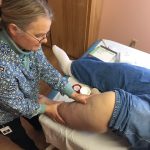Abigail Abbott and Cindy Kenyon, Grace Cottage Physical Therapists
If you have had breast cancer, it’s quite likely that you’ve heard of Lymphedema. As many as 50% of breast cancer survivors must deal with this condition.
But breast cancer isn’t the only cause of Lymphedema. It can be congenital, meaning you can be born with the tendency. Or it can be caused by dysfunction of valves in the vein of an arm or leg (in medical terms, this is called chronic venous insufficiency). If you have unexplained swelling in an arm or leg, it could be due to Lymphedema.
The good news is that help is available to relieve this swelling. Specially trained therapists can offer treatment to start you in the right direction, and they can teach you to carry on with this treatment for yourself.
Further good news: Lymphedema therapists are few and far between, but Grace Cottage now has two physical therapists certified to provide this therapy, Cindy Kenyon and Abby Abbott.
In order for us to explain what is involved with Lymphedema therapy, we first need to explain what causes Lymphedema.
Lymph is a clear fluid that moves through the body in order to remove impurities and infections. The lymph nodes filter the impurities out of the lymphatic fluid with the help of white blood cells. These lymph nodes are an important part of the system, filtering the fluid and keeping it moving. When lymph nodes are removed during cancer treatment, for breast cancer or any cancer, or when they are damaged by radiation, there is an increased potential for the lymphatic fluid to build up, causing the swelling known as Lymphedema.
The bad news is that, once it appears, Lymphedema is a permanent condition. It may show up quickly after cancer treatment, or it may show up years later. It usually begins slowly and progresses in intensity. If allowed to progress, it can cause significant debility.
The good news is that when caught early and treated properly, the effects of Lymphedema can be minimized. In the earliest stage, Lymphedema may be experienced as a swollen limb that feels heavy, with skin that feels tight. There may be a sense that clothes, watches, rings, bracelets, or shoes are becoming too tight. Breast cancer survivors usually experience this in their hands and arms. Survivors of other cancers, and those with congenital tendencies or vein valve malfunction are more likely to experience this swelling in their feet and legs.
It is important to consult your medical provider if you are noticing any of these symptoms so that the Lymphedema diagnosis will be accurate. Other things can cause swelling, and it’s important to rule these out first.
For those with Lymphedema, any structural damage to the lymphatic system cannot be cured or permanently repaired, but the effects of this damage can be improved by various aspects of the Lymphedema therapy.
During treatment, a Lymphedema therapist can help reduce the swelling by performing (and teaching the patient to perform) a gentle form of massage called “lymphatic drainage.” This helps to release any build-up of fluids. Proper training in this technique is important as this massage must be performed correctly in order to help, rather than hurt, the situation.
Patients will also be fitted for compression garments, the cost of which are usually covered by medical insurance. Unfortunately, at present, the bandages that are also required for treatment are not usually covered. These bandages and compression garments help to keep the swelling down.
Patients need to be aware that this first phase of treatment requires a commitment of one to two hours per day for two or more weeks. After the “intensive” program is completed, patients are prepared to self-manage the disease. They will know how to perform the lymphatic drainage massage on themselves, and they will know how to use the bandages and compression garments. At this point, less frequent office visits are needed.
In addition to these important treatment techniques, Lymphedema therapists teach their patients several lifestyle approaches that can help. For example, the lymphatic system is one component in the immune system, and when it has been weakened, infections become more of an issue. Care of the skin is critical to maintaining health and reducing the likelihood of an infection. In addition, certain exercises done in moderation can help keep lymphatic fluids moving. Weight loss can also help to reduce the effects of Lymphedema for some patients.
A diagnosis of Lymphedema can seem devastating at first. It is important to realize that help is available nearby, provided by caring, specially trained, and supportive therapists. To get started, speak with your medical provider for a referral to physical therapy at Grace Cottage Hospital, for Lymphedema management.
Bios:
Abigail Abbott, PT, joined the Grace Cottage Rehabilitation Department staff in 2015. She has a Bachelors in Russian language and literature from Columbia University and a Masters in Physical Therapy from Boston University. She is a Certified Lymphedema Therapist, trained by the Academy of Lymphatic Studies.
Cindy Kenyon, PT, has been a member of the Grace Cottage staff since 2008. She earned her PT degree from the University of Connecticut and her CLT certificate from the Dr. Vodder School International.

